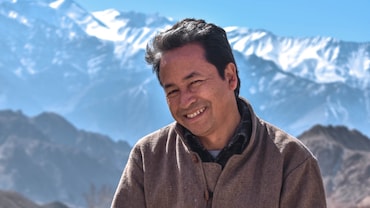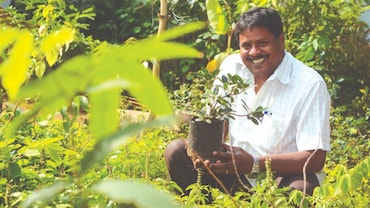- HOME
- /
- Features
- /
- Classic Reads
- /
Three Days to See
What would you look at if you had just three days of sight? The author, blind and deaf from infancy, makes some wishes

I have often thought it would be a blessing if each human being were stricken blind and deaf for a few days at some time during his early adult life. Darkness would make him more appreciative of sight; silence would teach him the joys of sound. Now and then, I have tested my seeing friends to discover what they see. Recently I asked a friend, who had just returned from a long walk in the woods, what she had observed. “Nothing in particular,” she replied. How was it possible, I asked myself, to walk for an hour through the woods and see nothing worthy of note? I, who cannot see, find hundreds of things to interest me through mere touch. I feel the delicate symmetry of a leaf. I pass my hands lovingly about the smooth skin of a silver birch, or the rough, shaggy bark of a pine. In spring, I touch the branches of trees hopefully in search of a bud, the first sign of awakening nature after her winter’s sleep.
Occasionally, if I am very fortunate, I place my hand gently on a small tree and feel the happy quiver of a bird in full song. At times my heart cries out with longing to see all these things. If I can get so much pleasure from mere touch, how much more beauty must be revealed by sight? And I have imagined what I should most like to see if I were given the use of my eyes, say, for just three days. I should divide the period into three parts. On the first day, I should want to see the people whose kindness and companionship have made my life worth living.
I do not know what it is to see into the heart of a friend through that ‘window of the soul’, the eye. I can only ‘see’ through my fingertips the outline of a face. I can detect laughter, sorrow and many other obvious emotions. I know my friends from the feel of their faces.
How much easier, how much more satisfying it is for you who can see to grasp quickly the essential qualities of another person by watching the subtleties of expression, that quiver of a muscle, the flutter of a hand. But does it ever occur to you to use your sight to see into the inner nature of a friend? Do not most of you seeing people grasp casually the outward features of a face and let it go at that?
For instance, can you describe accurately the faces of five good friends? As an experiment, I have questioned husbands about the colour of the wives’ eyes, and often they express embarrassed confusion and admit that they do not know.
Oh, the things I should see if I had the power of sight for just three days!
The first day would be a busy one. I should call to me all my dear friends and look long into their faces, imprinting upon my mind the outward evidence of the beauty that is within them. I should let my eyes rest, too, on the face of a baby, so that I could catch a vision of the eager, innocent beauty which precedes the individual’s consciousness of the conflicts which life develops. I should like to see the books which have been read to me, and which have revealed to me the deepest channels of human life. And I should like to look into the loyal, trusting eyes of my dogs, the little Scottie and the stalwart Great Dane. In the afternoon I should take a long walk in the woods and intoxicate my eyes on the beauties of the world of nature. And I should pray for the glory of a colourful sunset. That night, I think, I should not be able to sleep.
The next day I should arise with the dawn and see the thrilling miracle by which night is transformed into day. I should behold with awe the magnificent panorama of light with which the sun awakens the sleeping Earth. This day I should devote to a hasty glimpse of the world, past and pre-sent. I should want to see the pageant of man’s progress, and so I should go to the museums. There my eyes would see the condensed history of the Earth—animals and the races of men pictured in their native environment; gigantic carcasses of dinosaurs and mastodons which roamed the Earth before man appeared, with his tiny stature and powerful brain, to conquer the animal kingdom.
My next stop would be the Museum of Art. I know well through my hands the sculptured gods and goddesses of the ancient Nile-land. I have felt copies of Parthenon friezes and I have sensed the rhythmic beauty of charging Athenian warriors. The gnarled, bearded features of Homer are dear to me, for he, too, knew blindness.
So on this, my second day, I should try to probe into the soul of man through his art. The things I knew through touch I should now see. More splendid still, the whole magnificent world of painting would be opened to me. I should be able to get only a superficial impression. Artists tell me that for a deep and true appreciation of art one must educate the eye. One must learn through experience to weigh the merits of line, of composition, of form and colour. If I had eyes, how happily would I embark on so fascinating a study!
The evening of my second day I should spend at a theatre or at the movies. How I should like to see the fascinating figure of Hamlet, or the gusty Falstaff amid colourful Elizabethan trappings! I cannot enjoy the beauty of rhythmic movement except in a sphere restricted to the touch of my hands. I can vision only dimly the grace of a Pavlova, although I know something of the delight of rhythm. For often I can sense the beat of music as it vibrates through the floor. I can well imagine that cadenced motion must be one of the most pleasing sights in the world. I have been able to gather something of this by tracing with my fingers the lines in sculptured marble; if this static grace can be so lovely, how much more acute must be the thrill of seeing grace in motion.
The following morning, I should again greet the dawn, anxious to discover new delights, new revelations of beauty. Today, this third day, I shall spend in the workaday world, amid the haunts of men going about the business of life.
The city becomes my destination. First, I stand at a busy corner, merely looking at people, trying by sight of them to understand something of their daily lives. I see smiles, and I am happy. I see serious determination, and I am proud. I see suffering, and I am compassionate. I stroll down Fifth Avenue in New York City. I throw my eyes out of focus, so that I see no particular object but only a seething kaleidoscope of colour. I am certain that the colours of women’s dresses moving in a throng must be a gorgeous spectacle of which I should never tire. But perhaps if I had sight I should be like most other women—too interested in styles to give much attention to the splendour of colour in the mass.
From Fifth Avenue I make a tour of the city—to the slums, to factories, to parks where children play. I take a stay-at-home trip abroad by visiting the foreign quarters. Always my eyes are open wide to all the sights of both happiness and misery so that I may probe deep and add to my understanding of how people work and live.
My third day of sight is drawing to an end. Perhaps there are many serious pursuits to which I should devote the few remaining hours, but I am afraid that on the evening of that last day I should again run away to the theatre, to a hilariously funny play, so that I might appreciate the overtones of comedy in the human spirit.
At midnight, permanent night would close in on me again. Naturally in those three short days I should not have seen all I wanted to see. Only when darkness had again descended upon me should I realize how much I had left unseen. Perhaps this short outline does not agree with the programme you might set for yourself if you knew that you were about to be stricken blind.
I am, however, sure that if you faced that fate you would use your eyes as never before. Everything you saw would become dear to you. Your eyes would touch and embrace every object that came within your range of vision. Then, at last, you would really see, and a new world of beauty would open itself before you. I who am blind can give one hint to those who see: Use your eyes as if tomorrow you would be stricken blind. And the same method can be applied to the other senses.
Hear the music of voices, the song of a bird, the mighty strains of an orchestra, as if you would be stricken deaf tomorrow. Touch each object as if tomorrow your tactile sense would fail. Smell the perfume of flowers, taste with relish each morsel, as if tomorrow you could never smell and taste again. Make the most of every sense; glory in all the facets of pleasure and beauty which the world reveals to you through the several means of contact that nature provides. But of all the senses, I am sure that sight must be the most delightful.
About the author:
Helen Keller contracted a virulent disease, which resulted in complete loss of vision and hearing when she was 19 months old. Through a touch alphabet ‘spelt’ into her hand at age seven, Keller learnt language, and then speech, and the world opened to her. She graduated from Radcliffe College, USA, in 1904. Keller wrote prolifically, travelled widely, lectured on various topics and was awarded numerous honorary degrees from universities around the world.






